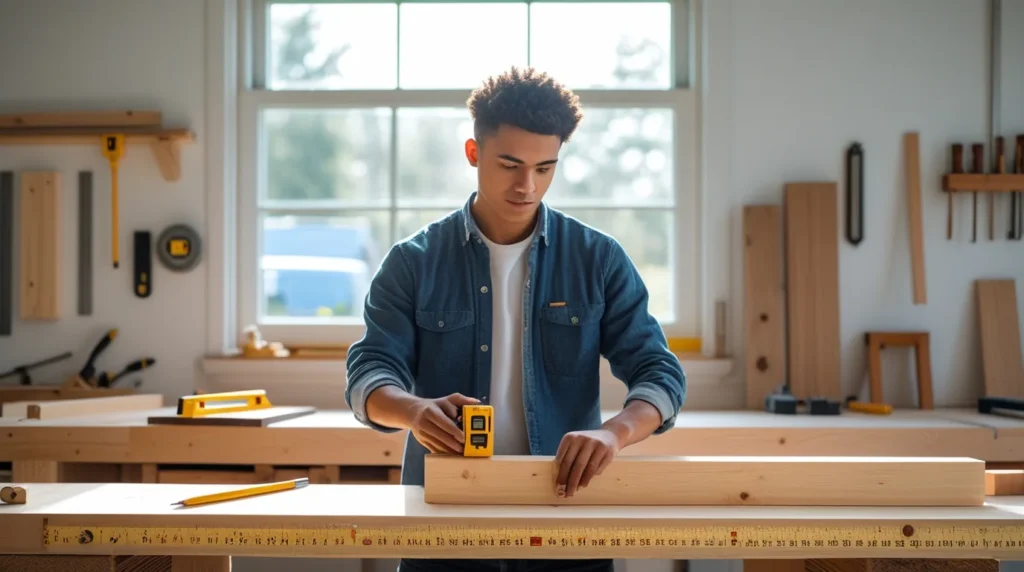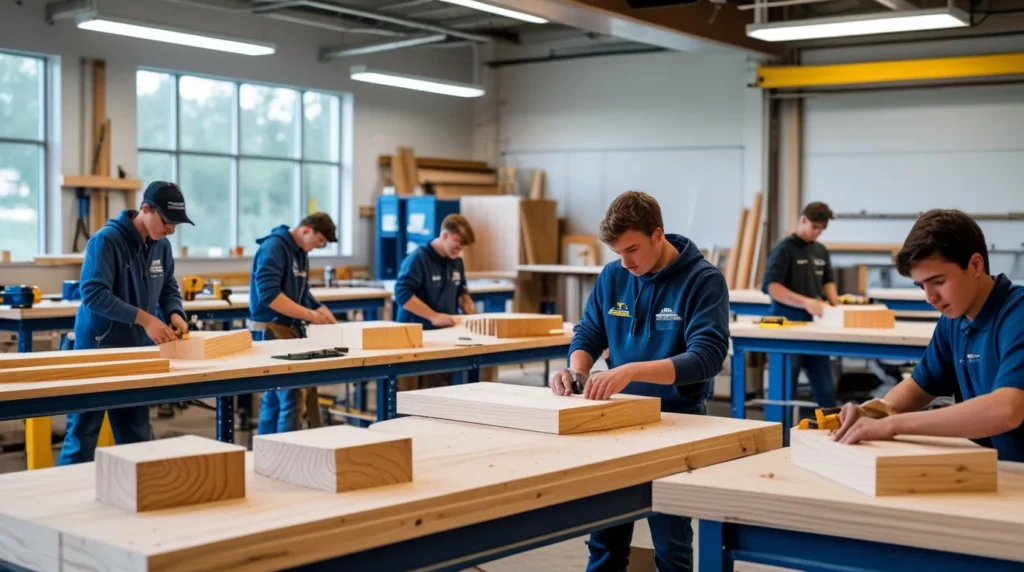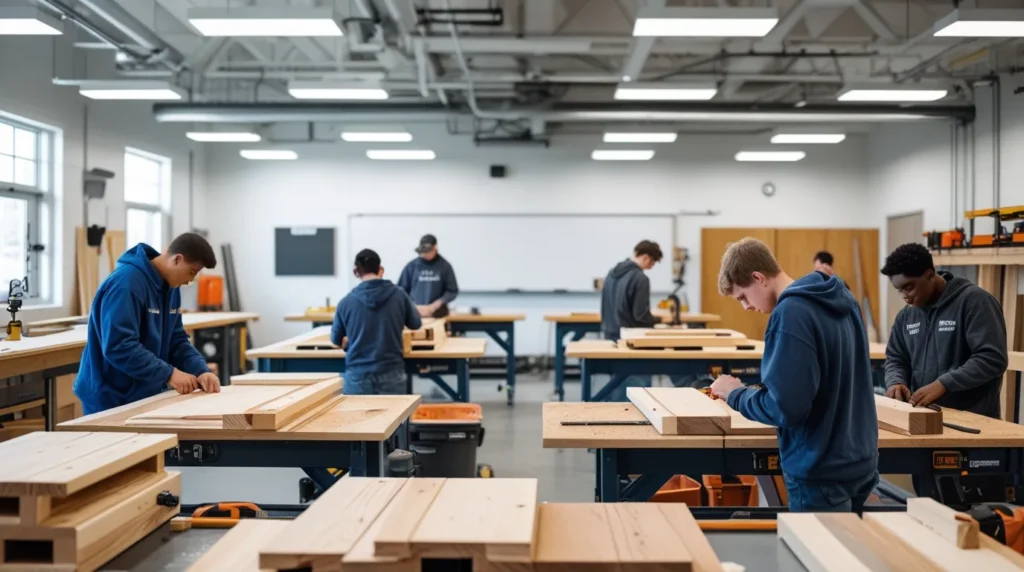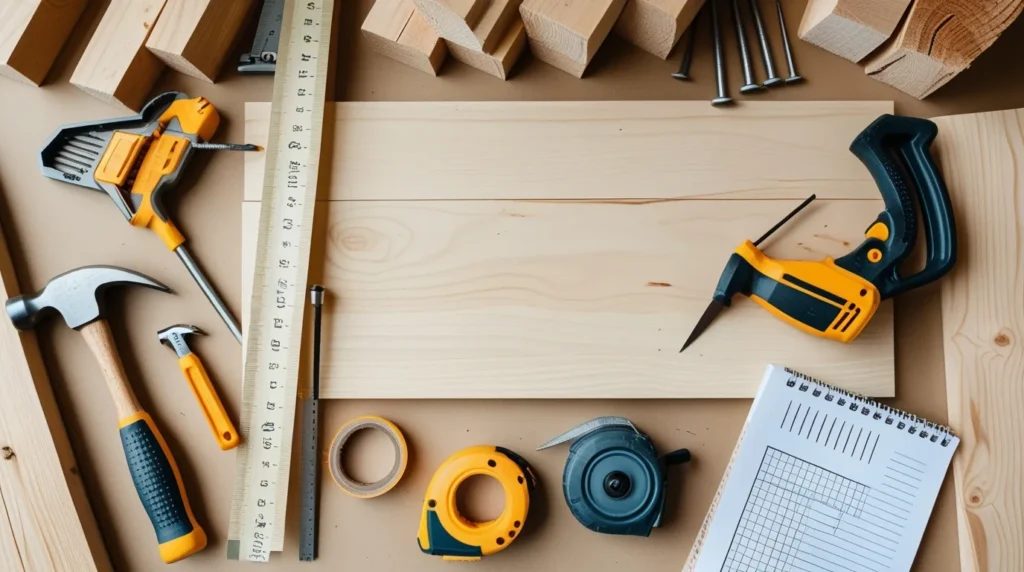Carpentry is more than just cutting wood. It’s a hands-on career where you build real things, homes, cabinets, porches, and even entire buildings. It’s a trade that takes skill, patience, and practice. If you enjoy working with tools, solving problems, and seeing the results of your hard work, this might be the perfect job for you. You might be wondering how to get into carpentry if you’re just starting out. Whether you’re still in school, looking for a new path, or changing careers, there’s a way to begin. This guide will show you step by step.

Is Carpentry Right For You? What To Know Before You Begin
Before starting a career in carpentry, it’s important to think about whether this path fits your interests and lifestyle. Carpentry is a hands-on job. It often means working with tools, moving around, and spending time both indoors and outdoors. If you enjoy making things, solving problems, and seeing the results of your work, this trade might be a great match.
Carpenters need to focus on details and follow building plans carefully. They also need to stay active, since the work can be physical. Getting dirty or tired is normal, but for many, the feeling of building something real is worth it. If you’re someone who enjoys working with your hands, learning new skills, and staying busy, carpentry could be a good fit for you.
How To Get Into Carpentry: First Steps To Take
The first step is learning the basics. You don’t need to know everything right away, but you do need to start somewhere.
Here are a few ways to begin:
- Volunteer or shadow a local carpenter or builder.
- Take a basic carpentry course at a nearby trade school or adult education center.
- Work as a helper on a construction site.
- Learn at home by building small projects using online tutorials.
Every carpenter starts at the beginning. What matters is being willing to learn. Even small jobs, like helping build a shed or fixing a fence, can teach you useful skills.

Understanding Carpenter Training And Skill Building
Carpenter training comes in many forms. Some people learn by doing, starting with simple tasks and learning more each day. Others join training programs or formal schools to study the craft.
Some of the skills you’ll learn include:
- Measuring and cutting wood accurately
- Reading blueprints or plans
- Using hand and power tools
- Building frames, floors, walls, and roofs
- Working safely on a job site
You don’t need to master everything at once. Good carpenters keep learning all the time. Over the years, your skills will grow with each project you finish.
What Are The Education Requirements For Carpentry?
The good news is, carpentry does not require a college degree. But there are still some things you’ll need to learn.
Most education requirements for carpentry include:
- A high school diploma or GED
- Basic math (especially for measuring and angles)
- Reading and writing skills for reading plans or safety instructions
- Communication skills to work with teams
Some training programs may ask for extra qualifications, but most entry-level roles are open to people who are willing to work hard and learn.
You can also boost your chances by taking carpentry classes during or after high school.

Finding A Carpenter School Or Carpentry Course Near You
If you want more structured learning, look for a carpenter school or carpentry course near you. These schools often offer short-term training and hands-on classes.
You might find these at:
- Technical schools or community colleges
- Trade schools focused on construction
- Union-run training centers
- Adult education programs
In these courses, you’ll use real tools and work on small projects. This helps you get used to building things the right way before joining a full-time job.
Many of these schools also help you find job placements after you complete the course.
Learn Carpentry Through An Apprenticeship Program
One of the best ways to become a carpenter is through a carpenter apprenticeship. This lets you work and learn at the same time.
As an apprentice, you’ll:
- Work under the guidance of a skilled carpenter
- Earn money while you learn
- Build experience on real job sites
- Learn safety, math, tools, and materials
Most apprenticeships last 3 to 4 years. You’ll get classroom lessons and on-the-job training. You can search for carpenter apprenticeships near me to find programs in your area.
Watts Built encourages aspiring carpenters to look into local apprenticeship programs that support hands-on learning and future job growth.

How Long Does It Take To Become A Carpenter?
Becoming a skilled carpenter doesn’t happen overnight. But if you take steady steps, you’ll get there.
Here’s a basic timeline:
- Entry-level laborer or helper: Start right away
- Short carpentry courses: 6 months to 1 year
- Full apprenticeship: 3 to 4 years
- Skilled carpenter: Around 4 years of total experience
So, how long does it take to be a carpenter? For most people, it’s a 3–5 year journey. But you can start earning and working much sooner, even as a beginner.
And remember: many carpenters continue learning new things throughout their careers.
Carpentry Trade Schools And Career Paths In North Idaho
If you’re in North Idaho, there are great ways to get started with training and career development in carpentry.
Trade schools in this area may offer:
- Carpentry basics and framing
- Tool handling and safety
- Interior and exterior construction techniques
- Job placement help after graduation
Local builders and companies often need people who are ready to work and learn. Starting locally helps you build connections with employers and other tradespeople in your area.
Watts Built has seen many new carpenters start right here in North Idaho and grow into strong, reliable tradespeople over time.
Do You Need A Carpenter Degree To Succeed?
You don’t need a college carpentry degree to be successful in this trade. What matters most is hands-on skill, good work habits, and a willingness to learn.
However, some people choose to earn certificates or diplomas in carpentry. These can help you stand out when applying for jobs or starting your own business. Certifications from trade schools or apprenticeship programs can also show that you know how to do the job safely and correctly. These are helpful when working on commercial or union jobs.
Final Tips To Become A Carpenter With Confidence
If you’re serious about becoming a carpenter, the best way to start is by taking one step at a time. Begin with the basics. You can learn by watching others, taking a class, or trying small projects at home. Asking questions is important too. Talking to experienced carpenters or working with them will help you grow faster. Look for apprentice jobs or helper roles where you can work and learn at the same time. Don’t be afraid to make mistakes. Every project is a new lesson. Practice often. Try building simple things like shelves, birdhouses, or frames to improve your skills. Always focus on doing the job safely. Follow instructions, wear protective gear, and learn the right way to use each tool. When you get hired, keep learning on the job. Great carpenters are always improving, no matter how long they’ve been working.
Want to start your journey in carpentry today? Reach out to Watts Built for guidance, training tips, or local apprenticeship recommendations. Let’s build your future one board at a time.




